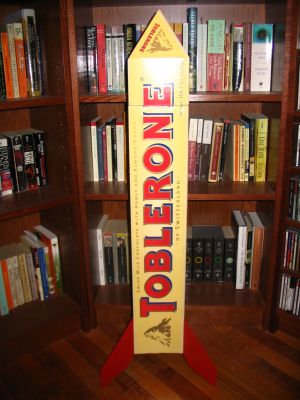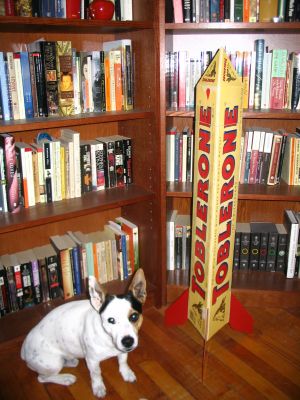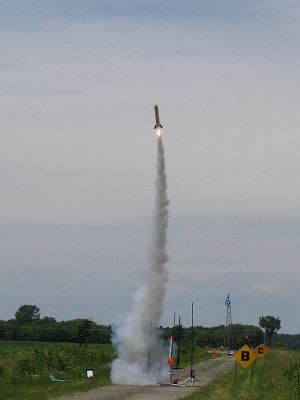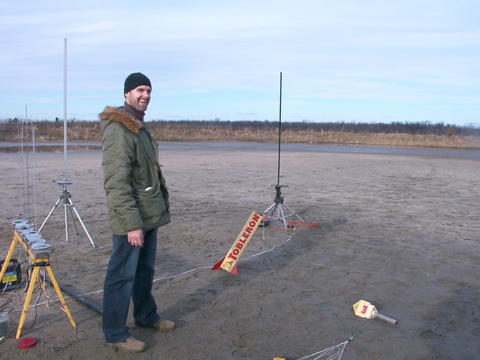Scratch Space Ship Tobler-One Original Design / Scratch Built
Scratch - Space Ship Tobler-One {Scratch}
Contributed by Richard Irwin
| Manufacturer: | Scratch |
Brief:
A 10-pound Toblerone converted to a single-staged, 29mm mid-power rocket (minus the chocolate). No, it isn't a joke. They actually make 10-pound Toblerones. Where? Who knows. It was a gift. But I pictured it with fins the moment I first opened it up!

Construction:
The pats list:
- Cardboard packing box as airframe
- 29mm motor tube, 24" long
- 3 G10 fins, very thin
- 2 triangular 1/8" plywood centering "rings"
- Laminated foam core pyramid nose cone
- 8ft light nylon shock cord with 1/8" x 24" Kevlar anchor
- 3/16" basswood triangle for nose cone shoulder
Since the actual Toblerone box was as flimsy as a regular sized Toblerone, I decided to use the triangular cardboard box that surrounded the bar for packing to use as the airframe. This meant I had to cut apart the labeled box and glue the three strips onto the packing box once it was all done. This was the only hard part of the building process. Things were looking good.
With all the flat edges, straight lines, and regular chocolate breaks, building was a breeze! Triangular centering rings are the way to go. The fins lined up perfectly, and the motor mount assembly slid in easily. No guessing was needed when lining up fins on each edge of a triangle.
 I cut off a 4" piece of the airframe to start off the nose cone. Using 3/16" fiberglass laminated foam core, I epoxied three triangular cuts together to for the peak then glued it to the 4" airframe piece. Voilá, a pyramid nose cone! I then cut three 6" x 4" rectangles of foam core and glued them to the inside of the exposed airframe end as a shoulder. The shock cord was anchored to the inside of the peak along with about 4oz of nose weight with epoxy. Then leaving some slack inside, I epoxied the shock cord again to the side of the foam core shoulder just to be sure it doesn't pull itself out. The shoulder end was then sealed off with a 3/16" thick basswood triangle wedged in between the shoulder strips. Well, I guess this was the hardest part after all.
I cut off a 4" piece of the airframe to start off the nose cone. Using 3/16" fiberglass laminated foam core, I epoxied three triangular cuts together to for the peak then glued it to the 4" airframe piece. Voilá, a pyramid nose cone! I then cut three 6" x 4" rectangles of foam core and glued them to the inside of the exposed airframe end as a shoulder. The shock cord was anchored to the inside of the peak along with about 4oz of nose weight with epoxy. Then leaving some slack inside, I epoxied the shock cord again to the side of the foam core shoulder just to be sure it doesn't pull itself out. The shoulder end was then sealed off with a 3/16" thick basswood triangle wedged in between the shoulder strips. Well, I guess this was the hardest part after all.
I wasn't sure of how airtight the cardboard airframe would be, so I extended the motor tube as far up as possible, so it was right underneath the nose cone shoulder. Hopefully this will work! The fins had long tabs which extended right to the motor tube, sandwiched between the two centering rings for solid joints. I then drilled two holes in the aft ring for the motor retaining blind nuts. The Kevlar® anchor was fastened to the top ring through a hole and epoxy. I didn't think a screw eye was necessary.
The inside top of the airframe got a layer of fiberglass to prevent a zipper. I also attached a ping pong ball to the shock cord where it touches the top airframe to further prevent a zipper. Regular cardboard isn't terrifically strong, so hopefully these methods will keep it in one piece.
Finishing:
Once everything was put together, I needed a beige/yellow paint to match the Toblerone labels for the edges of the airframe. The edges were painted with Duplicolor Antique Beige and the fins with Krylon Banner Red. The Toblerone label strips were then glued on with good old white glue. That was it!

Flight and Recovery:
The first flight took place at the Tripoli-Québec launch in St. Pie de Guire, Québec on June 25th, 2006. It was a beautiful, calm day, so I thought I'd finally let 'er rip! I wanted to give it a fairly smooth ride, so I used a G64-7W for the maiden voyage. (Actually, the 7 second delay was a bit long, so I drilled it down to 6.) I also added a pinch more black powder, because I wasn't completely confident with the ejection system. The RI at an earlier launch was worried that the nose cone had serious leaks around the shoulder, so we decided it would be best to come up with a more airtight system.
Since the motor tube extended up the airframe to about 3" under the nose cone's shoulder, he thought it would be a good idea to glue a tube in the center of the shoulder that went inside the motor tube. This would ensure a tight seal. The changes were made and we were good to go!
The flight was perfect! It cocked a bit off the pad, continued straight up to about 900', ejected the 36" chute at apogee, and landed without any damage. I was going to stick an H128 in for another flight but decided against it. Quitting while I'm ahead usually works best for me!

Summary:
This thing was fun to make, fun to eat, and makes even Level 3 guys take notice!
 |
 |